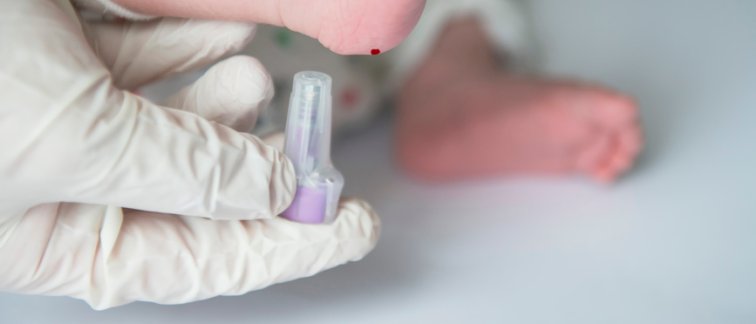Starting October 1, 2023, newborn boys in the Netherlands will be screened for adrenoleukodystrophy (ALD), an inherited metabolic disease. Boys with ALD are at high-risk of developing adrenal insufficiency and/or cerebral ALD. Newborn screening for ALD enables prospective monitoring and timely therapeutic intervention, thereby preventing irreversible damage and saving lives. Women with ALD develop a slowly progressive myeloneuropathy in adulthood. Therefore, the Dutch Health Council recommended to only screen boys for ALD. Amsterdam UMC has a key role in the screening and treatment.
In 2013, AGEM researcher Stephan Kemp of the Laboratory Genetic Metabolic Diseases and lead investigator of this study, along with pediatric neurologist Marc Engelen submitted a request at the Health Council of the Netherlands to add ALD to the newborn screening. Kemp: “I am very proud that this has become a reality now. ALD is the first sex-linked disease that is included in the newborn screening. Many colleagues of the RIVM and Amsterdam UMC contributed to this achievement.” With ALD included, the newborn screening program tests for 27 diseases.
The inherited metabolic disease ALD
Adrenoleukodystrophy (ALD) is a genetic metabolic disease with an incidence of 1 in 15.000 births. Boys with ALD can develop adrenal insufficiency and/or an inflammatory demyelinating brain disease (cerebral ALD) that is often fatal. Early diagnosis enables prospective monitoring and timely therapeutic intervention which prevents irreversible damage and saves lives. In the first week after birth, a few drops of blood are taken from the heel of newborns. This blood is tested for 27 diseases, including ALD. In case of a positive screening result for ALD (based on elevated C26:0-LPC levels, the presence of one X-chromosome and a variant in the ABCD1 gene), the child is referred to the Amsterdam Leukodystrophy Center (Amsterdam UMC). If the diagnose ALD is confirmed, the newborn enters the follow-up program to enable prospective monitoring and timely therapeutic intervention.
Girls and boys with ALD
Patients with ALD are asymptomatic at birth. Currently we cannot predict which boy will develop adrenal dysfunction and/or cerebral ALD. Before the age of 10 years, 1 in 3 boys with ALD develops an inflammatory demyelinating brain disease (cerebral ALD) that is often fatal. If diagnosed early, this can be treated effectively with a bone marrow transplantation. Adrenal insufficiency can be treated effectively with corticosteroid replacement therapy. Untreated adrenal failure may lead to significant morbidity. ALD newborn screening is predicted to diagnose 5-10 boys with ALD each year. Women with ALD develop a chronic and slowly progressive myeloneuropathy for which no disease modifying therapy is available. The Dutch Health Council adheres to the Wilson and Jungner criteria, and recommended to only screen male newborns for ALD, because boys are at high risk of developing adrenal insufficiency and/or cerebral ALD and therefore will have direct benefit from newborn screening.
Follow-up program
The Amsterdam UMC, along with the ALD research team, will maintain a crucial role following the implementation of ALD newborn screening. In particular, all boys who are diagnosed with ALD will be referred to Amsterdam UMC and enrolled in the follow-up program. Marc Engelen: “Once we conform the diagnosed with ALD, we can closely monitor the disease and initiate treatment in time. Our team has already developed comprehensive follow up and surveillance protocols well in advance of the implementation of ALD newborn screening”. Furthermore, lead investigator Stephan Kemp will serve as an advisor for the RIVM to monitor and analyze all incoming data related to the screening.

